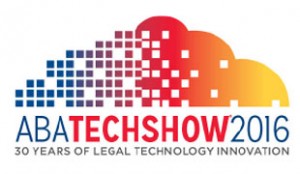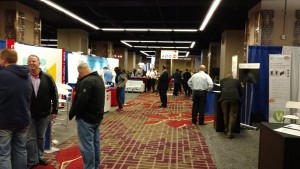By Guest Blogger, Joel Jacobson
 I practice with Rubicon Law Group, Ltd., a boutique firm in Denver that handles transactional, business matters and embraces technology. My work experience, my own interest in tech, and my involvement with the Colorado Bar Association led me to attend this year’s ABA TECHSHOW.
I practice with Rubicon Law Group, Ltd., a boutique firm in Denver that handles transactional, business matters and embraces technology. My work experience, my own interest in tech, and my involvement with the Colorado Bar Association led me to attend this year’s ABA TECHSHOW.
In this post I’ll share background on the conference, information from my favorite sessions, and the legal technology that interests me most. Links are included through-out so that you can click right to the source to learn more about the speakers or products. Please do reach out if you have any questions about the conference or legal technology in general.
The Conference
From March 16th – March 19th, the ABA TECHSHOW held its annual conference in Chicago. This year marked the conference’s 30th year. The ABA Techshow is an impressive resource for solo and small firms interested in implementing the latest legal technology. It is 2.5 days of all things technology and law. There are speaker sessions, social events, and a hall full of vendors exhibiting the latest technology advancements. Between the substantive and social events, the conference keeps attendees’ schedules full from breakfast until 11 pm.
There is opportunity to pick from different tracks depending on your interests (e.g. Word, Mac, starting a new practice, practice management, cyber-security, and productivity). I focused my time on Mac, Word, and practice management. I made a plan, chose sessions to attend, and reviewed the list of exhibitors beforehand to identify specific companies to talk with. I’m glad I did this because it helped me avoid wandering and feeling overwhelmed.
A key theme at the conference is empowering lawyers and clients through thoughtful technology. A lawyer should make legal services as frictionless as possible and treat clients as they are accustomed to when using other service providers (e.g. banking, taxes, health records). Today, even these regulated industries give online options for using their services, do not always require in-person visits, permit payment by credit card, share documents electronically, and do not use fax machines. Why can’t law be the same?
Sessions
Thursday and Friday are filled with interesting speakers from around the country. I was very impressed by the quality of speakers and the relevance of the sessions.
A favorite of mine was how to build effective relationships with General Counsel led by the GCs of Rocket Lawyer, Alon Rotem, and Thomson Reuters, Ed Friedland. The talk stressed the importance of regular communication in every aspect of the relationship. Whether it be legal fees or counseling on difficult choices, communicating well with in-house counsel is they key to a long-term relationship. Some practical tips included:
- ask questions about the business to really get to know it and provide actionable legal advice based on the business;
- be responsive which means responding to emails within one business day;
- be proactive in discussing fees; and
- When pitching your law firm describe how the work will get done, who will be doing it, and tailor everything to solving their specific problem.
Nicole Bradick, Joshua Kubicki, and Adam Ziegler presented a quality session on lawyers as entrepreneurs. Law is a profession, but lawyers are entrepreneurs in the sense that they create and run businesses. The business of running a law firm is hardly taught in law school, but it is critical to creating a healthy practice. Lawyers should treat problems as opportunities for action and not fear change. Each presenter has written and spoken extensively on this topic.
A Word power hour was helpful. After all, Word is the tool many lawyers spend the most time with. Barron Henley led the session and I liked his point of the importance of effectively using the tools you already own. In the case of Word, knowing how to use automation and formatting features helps serve clients more efficiently and with minimized errors. A useful trick I learned is that ctrl + spacebar removes formatting within a selected body of text. He also mentioned that his company conducted a survey and found that Calibri is a pleasing alternative to Arial or Times New Roman. I agree.
I enjoyed the typography session by Matthew Butterick and Joseph Bahgat because how a lawyer’s documents look matters. Some clients and other lawyers judge how legal documents look as much as what they say. Lawyers should know that typography is about more than just fonts. The presenters discussed effectively using white space, headings, tables, and styles to make documents more visually appealing, easier to read, and more persuasive.
A topic near and dear to me, reviewing the framework and arguing in favor of electronic signatures, was led by Dan Puterbaugh, a lawyer with Adobe, and George Bellas. The presenters explained how electronic signatures are valid in the US and EU, utilized by leading global companies, and that lawyers should not fear electronic signatures. They are binding and enforceable under the state Uniform Electronic Transactions Act (UETA) and since 2000, under the federal Signatures in Global and National Commerce Act (ESIGN). Skeptics are encouraged to reference Lorraine v. Markel, 241 F.R.D. 534 (D. Md. 2007) which is a goldmine for how electronic signatures hold up in litigation.
Click here for part two which covers technology in—online marketing and business development, document assembly, practice management, and the idea of software replacing lawyers.
Joel is a corporate attorney with Rubicon Law Group, Ltd., and enjoys solving problems for growing, innovative companies. Joel currently serves as a Supervising Attorney at the Entrepreneurial Law Clinic in the University of Colorado Law School and the Executive Council of the Colorado Bar Association Business Law Section. He received his undergraduate degree from the University of Michigan and his law degree from the University of Wisconsin Law School. He can be reached at joel@rubiconlaw.com.

Comments on this entry are closed.